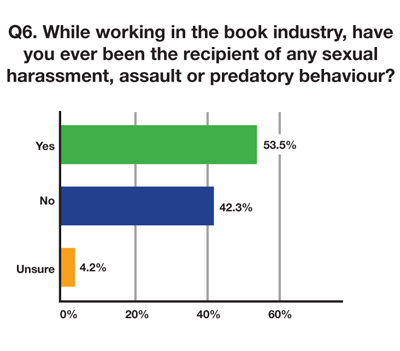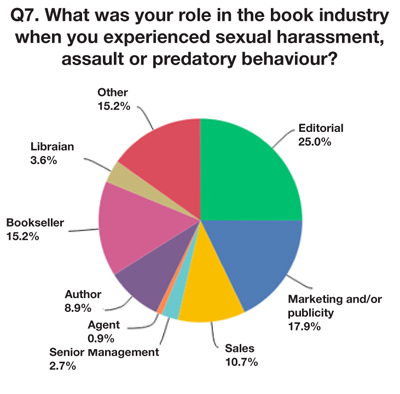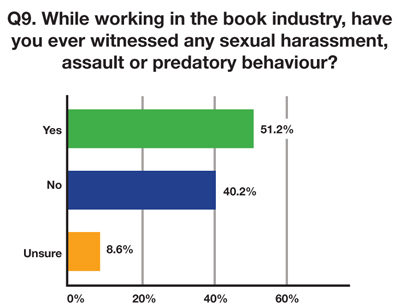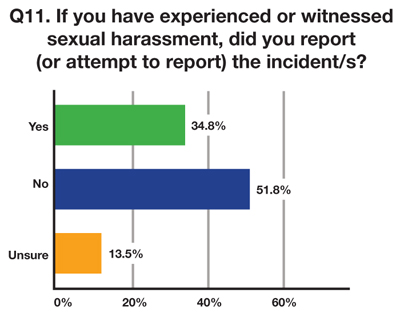Over half of book-industry survey respondents report sexual harassment
Just over half (54%) of all respondents to Books+Publishing’s survey on sexual harassment in the Australian book industry have reported being sexually harassed.
Books+Publishing received 213 responses to the survey. Of this number, 114 said they had been sexually harassed while working in the book industry, 101 of which identified as female, 11 as male and two as gender non-binary. A further nine respondents to the survey (four percent) said they were unsure if they had experienced sexual harassment or not.
Fifty-seven percent of all women surveyed and 38% of all men surveyed said they had experienced sexual harassment in the book industry. Among the respondents who identified their gender as non-binary, 40% said they had been sexually harassed.
People in the industry aged 25-34 and 35-44 were more likely to have been affected by sexual harassment, with the two age brackets reporting their experiences at a higher rate than the average: 60% for those aged 25-34 and 65% for those aged 35-44.
Just over half (51%) of respondents also said they had witnessed sexually inappropriate behaviour in the workplace, and nearly a tenth (9%) reported they weren’t sure if the incidents they saw would qualify as sexual harassment.

The Books+Publishing survey directed respondents to a list of examples of sexual harassment identified by the Australian Human Rights Commission. One respondent suggested this list was too broad and that some of the items were open to misinterpretation, for example, that ‘staring or leering is highly subjective’.
The incidents reported encompassed a wide range of experiences, including leering, suggestive jokes, comments about physical appearance, intrusive questions about personal life, repeated unwanted advances, inappropriate touching and groping. One person reported being raped at a publisher’s sales conference.
The perpetrators were often identified as men in positions of power, such as men in senior publishing roles and older male authors. In bookselling, the perpetrators were frequently male customers.
Incidents of sexual harassment were spread across numerous sectors in the book industry. A quarter of those who reported being sexually harassed said they were working in editorial at the time, 18% were working in marketing or publicity, 15% in bookselling, 11% in sales and nine percent as authors. Agents, librarians, senior management and people who responded ‘other’ made up the remaining 24% of respondents.

Publicity trap
People in roles related to sales or marketing and publicity were more likely to have encountered sexual harassment, with 75% of respondents in sales and 74% in marketing and publicity stating they’d experienced it at some point in their careers.
Young female publicists appear to be particularly vulnerable to sexual harassment. As one respondent put it: ‘One of our company’s focuses is “author care”, which for a publicist means make the authors happy no matter what the cost. Publicists are essentially pimped out and if you dare complain about it, the big impressive campaigns will be taken off you.’
Numerous female publicists shared similar stories of having to fend off repeated unwanted advances from older male authors. ‘Working in publicity as a mid-twenties female, often dealing with much older male authors, many of whom were public figures and of high standing in society, I was often subjected to suggestive language and inappropriate familiarity with touching (arm around the waist etc), which was always incredibly uncomfortable,’ said one respondent. ‘It was considered an unfortunate part of the job and we were expected to tolerate it.’
Another respondent observed: ‘Over my years as a publicist I had incidents of unwanted touching and comments from a bookseller, an author and a senior journalist. The first and last incidents were at industry social events. The author was touring and made numerous attempts to hit on me over several days. I felt trapped, and thought I had to endure him and very gently, smilingly rebuff his repeated overtures rather than cause him embarrassment and risk upsetting his publicity and event commitments. With more experience under my belt I would probably have told him to back off and reminded him that the hotels and restaurants we went to were actually my workplace, but at the time I felt I had to just get through it for the sake of his books and the company I worked for.’
Writers’ festivals and book tours were highlighted as particularly fraught environments, where the boundary between professional and social interactions could be easily crossed and power differences between authors and publicists exploited.
‘In my experience event settings are where harassment is most likely to occur,’ said one female editor. ‘Book publishing, as a social industry with lots of launches and public readings lends itself to these kinds of abuse with little accountability. One way forward is leadership at these events where the people responsible for the event/evening are known and present themselves as approachable and as allies.’

‘Just suck it up’: harassment in bookselling
Another common story was from booksellers being harassed by customers, although senior managers and co-workers were also implicated. ‘Leering by men is extremely common in my job,’ said one respondent, who also reported ‘sexual advances and unwanted comments’ from male managers, co-workers and customers. ‘This has happened so many times in working in the bookseller/buyer trade—over fifty times, I would guesstimate. There is little in place to understand how to deal with these situations. As someone serving the general public, one feels one should just “suck it up” and be polite to not cause a fuss.’
‘It is a regular occurrence—several times a year,’ echoed another respondent, who reported male customers ‘making unwelcome comments about my physical appearance, as well as persistent and unwelcome invitations to drink or meet outside of work’.
Another bookseller spoke about a manager who ‘would make off-colour remarks and jokes all the time about sex and women’, recalling an incident where he put a book about female masturbation on her desk and made a joke about it in front of her co-workers. ‘I mention this because it’s not the most egregious example of harassment I have experienced, but because it is such an insidious example of conduct that is out of line, inappropriate and demeaning but that people make room for with excuses and handwaving about “Oh that’s just so-and-so, that’s how he is”,’ she said.

(This chart excludes respondents who answered both ‘no, I did not experience sexual harassment’ and ‘no, I did not witness any sexual harassment’.)
Reporting behaviour
Just 33% of women who experienced or witnessed sexual harassment said they reported the incidents, with the majority (54%) responding that they had not taken the issue further. A further 13% declined to answer.
Male respondents were only slightly more likely to report their cases, with 42% stating they’d informed someone of the incident and 42% saying they hadn’t. Of the respondents who identified as gender non-binary, 50% said they reported their experiences, and 25% said they did not. Overall, 35% of people who said they either witnessed or experienced sexual harassment reported their incident, while 52% did not make a report and 13% declined to answer.
Reasons given for not wanting to report an incident included feelings of helplessness or humiliation, the lack of a reporting process or trustworthy channels, being in a culture that implicitly condoned such behavior, and above all, fear of repercussions to the respondent’s professional prospects.
In many instances, the accused’s seniority or connections in the industry was a direct influence on whether an incident would go reported. ‘I was hesitant because I was aware that I was making a complaint about a very favoured member of staff, and I knew, if it was a choice between him or me, it would be him,’ said one bookseller. Another respondent recalled that ‘there was little point … the only person to report it to was the main perpetrator,’ and others were deterred by the knowledge that ‘you would have to continue to work with that person, knowing they knew you had reported them’.
The pervasive nature of sexual harassment caused many respondents to fear their experiences were ‘too small’ or too commonplace to report. ‘I didn’t know who to report the incident to, and was worried that I would be viewed as a troublemaker,’ said one editor. Others expressed similar fears of being seen by others as ‘overreacting’ or someone who ‘can’t take a joke’. ‘The one-off incidents don’t seem like a big deal,’ said one respondent, ‘it’s when you put them all together.’
One male respondent said he was uncomfortable reporting inappropriate comments to management because he ‘works in a predominantly female environment’. ‘As a result, I feel I have no one I can comfortably approach about sexual harassment,’ he said.
Where harassment was reported, consequences varied wildly. Some cases resulted in ‘swift and serious action’ and ‘proper training and counselling’, but many respondents also said their case was mishandled with insensitivity and poor communication, if not dismissed altogether. One person said reporting the issue resulted in retaliatory bullying by the perpetrator.
In several of the cases, harassment was treated as a ‘personal issue’ rather than a ‘workplace issue’, and elicited responses such as ‘he’s just like that’, ‘he didn’t mean it the way you took it’ or ‘don’t go out with him if you don’t want to’, and one person working in production said she ‘was informed it was my responsibility to take it further’.
The majority of respondents (60%) said their companies had procedures in place to protect staff from sexual harassment, but some questioned the effectiveness of these policies. One respondent stated the processes left staff feeling ‘very uncared for and stressed afterwards’, while another felt, ‘in practice, the process continues to penalise and blame the victim’.
‘Procedures don’t seem to account for the fact that sexual harassment has an emotional effect on both recipients of the behavior and the witness,’ said one person in marketing and publicity. ‘[Reporting an incident] was incredibly emotionally draining and a “process” can’t really help with this.’
A further 21% of respondents said there were no procedures in place, while 13% were unsure. Of the six percent who felt the question was not applicable to their work, many were freelancers.
Has the industry cleaned up its act?
Books+Publishing didn’t ask respondents when their experiences of sexual harassment took place; while a couple of respondents described an improved workplace environment compared to earlier in their careers, others related more contemporary experiences of sexual harassment.
‘Essentially the first five points in the [Australian Human Rights Commission] list were common in the 1980s and 1990s,’ said one respondent. Another said that the sexual harassment she experienced earlier in her career wouldn’t happen today. ‘Younger men in the industry are by and large much better behaved and more respectful,’ she said.
However, some of the experiences reported are clearly more contemporary. One respondent said that ‘when discussing the “Fifty Shades” phenomenon, I was asked in a staff meeting if young women really are into sexual domination “and all that”, as I was the youngest woman there so could best represent’. ‘The amount of sexual innuendo and jokes that go on in meetings that are predominantly men is pretty astounding,’ she added.
Several respondents observed that sexual harassment was still pervasive in the book industry today. A key theme was the potential for the abuse of power in an industry dominated by women but where men are overrepresented in senior management. ‘It is rife. You would think it wouldn’t be, since it is a female-dominated industry, but the “heads” are still often male,’ said one freelance editor. Another respondent who works in events programming said she has a ‘whisper network of young female friends who work in the industry and we actively work to protect each other and ourselves’.
An editor for a large publisher observed: ‘This is an industry with older, established men in the corner offices and young women working themselves to the ground in the cubicles, trying to earn themselves a break; that is, an industry where sexual harassment based on power differentials is bound to flourish.’
Yet another respondent pointed out sexual harassment was inextricably linked to other forms of harassment. ‘Sexual harassment in publishing sits hand in hand with racial harassment and all the microaggressions that sit along the spectrum before an actual incident occurs,’ she said. ‘Publishing is such an overwhelmingly middle-class white industry, and although the vast majority of people I’ve worked with are women, it’s always men in the top positions of power. The power imbalance is responsible for so much of the harassment, ignorance and insensitivity that is rife in publishing houses.’
However, other respondents said they felt sexual harassment was less common in the book industry than in other industries because it is largely female-dominated.
‘I have worked at two publishers and both have had a 90/10 split female to male employees,’ said a respondent in marketing. ‘Within the companies themselves, I have never felt threatened or had any issues and would be very surprised if I did. The only times I’ve experienced anything inappropriate was always from authors or people we were working with externally, which is much harder to manage.’
A few respondents who had worked in other sectors felt the publishing industry was ‘comparatively safe’. ‘Having worked in other industries I think publishing has stronger awareness of risks and generally good preventive measures compared to other industries,’ said one respondent in senior management. ‘But nowhere is immune from this risk and we all need to be aware of danger, promote good behavior and have strong support for alleged victims and fair investigations.’
Next steps
Among the suggestions to promote a zero-tolerance approach to sexual harassment in the industry were calls for better training, clearer guidelines and greater education. One independent bookseller argued for ‘more education on sexual harassment in the workplace that is externally organised and delivered’. ‘Ideally, staff need somewhere to go when they are experiencing sexual harassment that is separate from their company and workplace so they are professionally supported and heard,’ she said.
Other suggestions included training staff, particularly senior staff, ‘in more sensitive and constructive responses to sexual harassment scenarios’, as well ‘holding people to account and professional development workshops on consent and communication’.
One publicist recommended promoting discussions between senior and junior staff in a more informal setting. ‘It might make a difference if senior staff had coffee with publicists or junior staff every now and then, and encouraged them to feel they will be heard if they ever report such incidents.’ She added, ‘If staff are armed with clearly stated management support and phrases like “No thanks, this situation is work for me so I won’t take you up on that”, they might find it easier to manage difficult authors. But it would obviously be far better if it wasn’t left to young women to manage the behaviour of sleazy authors in the first place!’
Category: Local news Special Bulletin news




